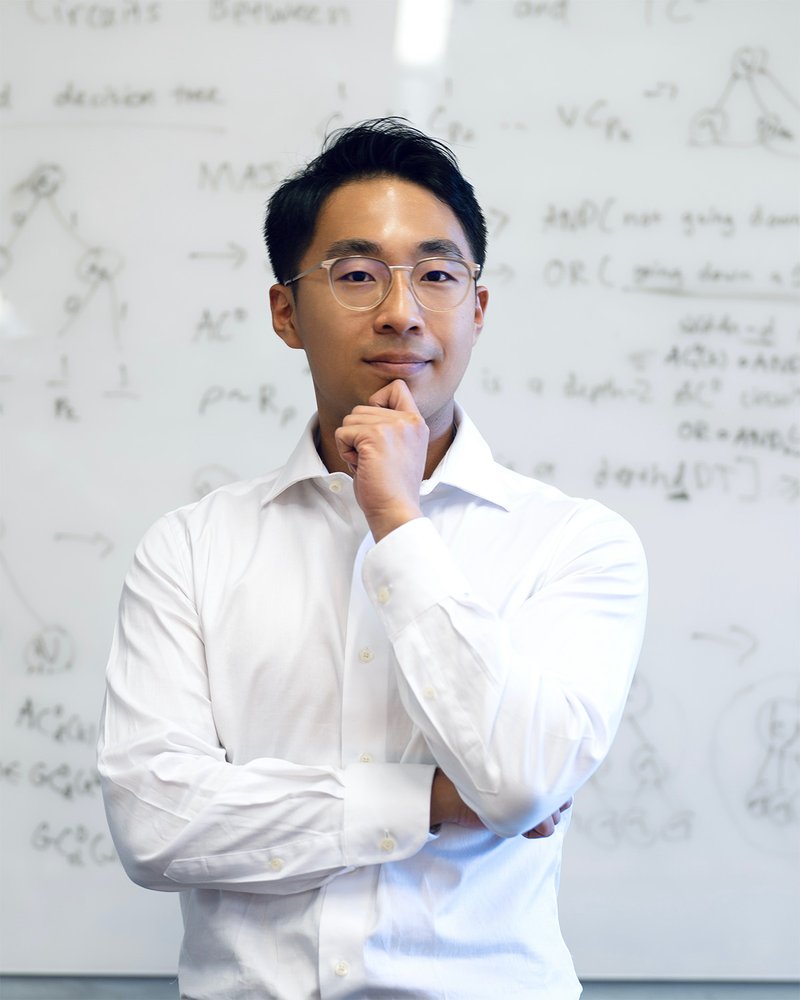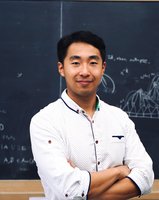Bio: Yuxuan Zhang, CQIQC PDF with an appointment at the Physics Department and the Vector Institute for Artificial Intelligence, works with Professors Yong-Baek Kim and Juan Carrasquilla and has broad interests in quantum computing, condensed matter physics and machine learning.
Yuxuan completed his early education in his hometown, Tangshan, and earned a B.S. in physics from the University of California, Santa Barbara in 2016. He spent a year at the Institute of High Energy Physics working with fundamental particles before moving on to The University of Texas at Austin, where Scott Aaronson and Andrew Potter mentored him through his Ph.D. studies.
Yuxuan is a part-time poet, amateur pianist, and unprofessional photographer.
CQIQC: Can you tell us about your particular area of expertise: roughly what it entails?
YZ: Since the dawn of civilization, humanity has been seeking answers to the question of what the world is made of and how it functions. Ancient Greeks and Chinese took more or less philosophical approaches and after the Renaissance, we developed experimental-based modern science. For the majority of time, we believed that the universe was a delicate, seemingly random, yet ultimately deterministic craftwork.
A century ago, physicists like Planck, Einstein, and Born began to challenge this belief, which led to the foundational work of quantum physics. It turns out that the reality is that even if you know every bit of information of an object, you still wouldn’t be able to predict its motion deterministically. In a sense, a coin can be in the superposition of heads and tails!
Quantum effects are delicate, and this is why quantum mechanics is counter-intuitive. It would become crucial in atom scales from material science to speeding up computations. It is vital for us to understand quantum physics in order to harness the power of nature.
CQIQC: What kind of problems appeal to you?
I am interested in the intersection between quantum physics and quantum computation. Despite the fact that we’ve discovered quantum mechanics for more than a century, the computational models of contemporary devices like our laptops still make no use of it! Luckily, in recent years, there has been a growing interest in building the theoretical and experimental work of quantum computers, which have great potential to speed up computation, simulate physics, and revolutionize encryption and communication.
Broadly speaking, I'm strongly motivated by answering the following question: how does our knowledge of quantum physics advance quantum computation, and how can quantum computers help us to better understand physics? In these studies, I also incorporate tools like machine learning to improve the quality of our results.
Broadly speaking, I'm strongly motivated by answering the following question: how does our knowledge of quantum physics advance quantum computation, and how can quantum computers help us to better understand physics? Yuxuan Zhang
CQIQC: What led you to be interested in this particular area, and how did it bring you to U of T?
As an undergraduate at the University of California, Santa Barbara I was obsessed with elementary particle physics, which is the study of ‘what our world is fundamentally made of’. Influenced by my mentor Joe Incandela, I worked on improving algorithms for large particle colliders.
During graduate school at the University of Texas at Austin, I developed a new interest in computer science which led me to the field of quantum computing. On the other hand, people believe that quantum computers can help physicists tackle otherwise hard problems in particle physics. Throughout my PhD, I was lucky to be mentored by computer scientist Scott Aaronson and physicist Andrew Potter.
U of T has some of the strongest researchers in quantum technology and computer science. For example, my hosts here Yong-Baek Kim and Juan Carrasquilla are both celebrated figures in their own fields: physics and machine learning. Here I can pursue quantum science while learning about the cutting-edge development of AI from the Vector Institute. Plus, as someone born in the north, I kinda miss the snow!
CQIQC: What are you currently working on? Do you see this as a largely theoretical pursuit, or are there potential practical applications?
As a theorist, one of my focuses is on developing quantum algorithms for simulating various quantum systems. Specifically, some of these algorithms have been implemented on prototype quantum computers.
While I maintain a close collaboration with experimentalists, some of my interests can be more abstract, and mathematical and can be connected to the study of black holes. These questions will be more of a long shot to implement but could shed light on other applications.
CQIQC: What would you say has been your career highlight to date?
Perhaps ‘highlight’ is a strong word, but I can definitely recall a few memorable moments. It was cheerful when I finished college near the top of my class; it was joyous when I first independently solved an open problem and got it published; it felt fruitful when we got to work on an actual quantum computer and report the results in high-tier journals (like PRX Quantum and PRL). I had a lot of fun interacting with my mentors when I was an intern at Cisco, and I am also very proud of the undergraduate students I mentored, seeing them flourishing at schools like Stanford, UCB, and USC.
Of course, it was a celebratory night when I received the CQIQC offer from Dvira Segal!
CQIQC: What are your hopes for the future?
As I have only just moved from the US, I hope to first establish my research network: in the first year or so I hope to collaborate with people at CQIQC and have a few projects out myself. I also hope to generate good research ideas myself and continue mentoring students. Long-term-wise, I would like to pursue a professorship to continue my passion for exploring the unknown.

photo by Mengning Geng
CQIQC: What challenges would you say loom largest for researchers in your area?
If I were to compare our current stage of quantum computation to building traditional computers, we are still in the age of vacuum tubes. We still haven’t found the equivalence of transistors for quantum computers: the operations we are performing are noisy. In the next decade or so, scaling up the quantum computers while suppressing their noise level is one of the most crucial things to do.
CQIQC: If you were to talk to someone considering the U of T post doc program, what advice might you give them? (Or, if this isn’t functional, to anyone in a career in STEM?)
To students who are seeking to get into academia, I suggest starting early and don’t be afraid to try out different things. There are tons of examples of top-class researchers transferring from one field to another until they find the playground that fits them the most. Also, other than meeting with your professors, I would recommend finding a mentor, such as a postdoc or a senior PhD in the group whom you can ask questions.
For people who are thinking about coming to UofT for a postdoc program: I strongly encourage you to reach out and chat with the faculty members here before applying - people are friendly and this is how I ended up with the position. Besides the good research people do here, Toronto has some of the best food, colorful city life, and diverse culture in the whole North American continent!
CQIQC: Where do you think your research will take you next?
I hope to use my knowledge to design better algorithms and help improve the hardware designs. In return, these better designs will help us study quantum physics, forming a positive feedback loop. I am excited to be part of this quantum revolution!

